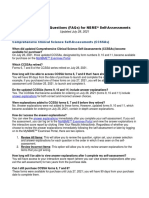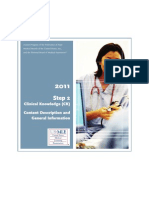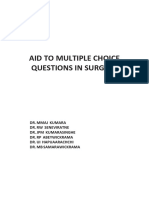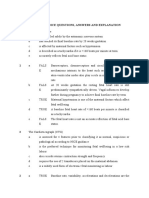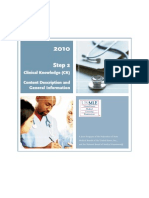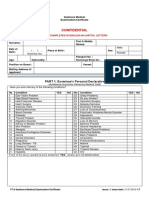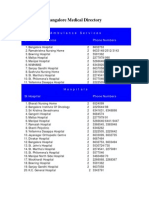Medical Student Clinical Assessment Form: (Mm/dd/yy) (Mm/dd/yy)
Medical Student Clinical Assessment Form: (Mm/dd/yy) (Mm/dd/yy)
Uploaded by
Natasha ReddyCopyright:
Available Formats
Medical Student Clinical Assessment Form: (Mm/dd/yy) (Mm/dd/yy)
Medical Student Clinical Assessment Form: (Mm/dd/yy) (Mm/dd/yy)
Uploaded by
Natasha ReddyOriginal Title
Copyright
Available Formats
Share this document
Did you find this document useful?
Is this content inappropriate?
Copyright:
Available Formats
Medical Student Clinical Assessment Form: (Mm/dd/yy) (Mm/dd/yy)
Medical Student Clinical Assessment Form: (Mm/dd/yy) (Mm/dd/yy)
Uploaded by
Natasha ReddyCopyright:
Available Formats
Medical Student Clinical Assessment Form
Please submit this signed form via email to AUC’s Office of the Registrar:
aucregistrar@aucmed.edu
880 SW 145th Ave., Suite 202, Pembroke Pines, FL 33027 • Tel: 305.446.0600
Student Name: ______________________________________ Clinical Site: ____________________________________
Student Number: ___________________________________ City & Country: ________________________________
Core Clerkship/Elective: ___________________________ Date Started (mm/dd/yy): _______________________
Specialty: ____________________________________________ Date Ended (mm/dd/yy): ________________________
Observation Setting: Inpatient Outpatient Both
Instructions for using this form:
An individualized mid-clerkship review at the midpoint of every core clerkship or elective is
required for all students; a formal mid-clerkship review and a written remediation plan is mandatory
for any student whose performance is deficient (defined as either below expectations or failing in one
or more categories – see below).
Summative assessments are used at the end of core clerkships and electives to determine whether
students have mastered the Association of American Medical Colleges’ entrustable professional
activities (EPAs)1 and specific Accreditation Council for Graduate Medical Education (ACGME)
competencies.2 This assessment form is to be completed at the end of each clinical rotation (twelve-
week core clerkship, six-week core clerkship, or an elective). If there are multiple sources of
information on a student’s performance, then the Clerkship or Elective Director is expected to
incorporate that information into one assessment form for the rotation. Only one Medical Student
Clinical Assessment Form should be submitted for each student within 30 days of the end of
each clerkship or elective.
Medical educators who are completing Medical Student Clinical Assessment Forms should be aware of
the stage at which the student is in their course of learning. For example, if this is a student’s final
clinical rotation or placement, expectations are naturally higher than if the student has not previously
undertaken any clinical rotations or placements.
Rating scale:
Exceeds expectations: Is an advanced student who functions consistently at a level higher than is
usual for this stage of training.
Meets expectations: Is a capable student who performs consistently at a level appropriate for this
stage of training with no serious weaknesses with respect to that specific clinical skill or category.
Below expectations: Falls short of an adequate performance in a specific clinical skill or category.
Has weaknesses that need addressing. May have received mid-clerkship feedback identifying the
relevant issues and has made a partial remedial response. For any student who receives this
rating in one or more areas, this assessment form must include a specific description of feedback
given to student, level of response, and areas in need of further remediation in the Comments
section.
Fail: Has serious weaknesses. Falls substantially short of an adequate performance in this category.
May have received mid-clerkship feedback identifying the issues, but has not subsequently acted
on it or improved. For any student who receives this rating in one or more areas, this assessment
form must include detailed comments to identify and describe the issues, feedback provided, and
persistent problems in the Comments section.
Page 1 of 4 American University of the Caribbean School of Medicine v4.3 2016NOV
1. MEDICAL INTERVIEWING SKILLS: The ability to take an effective history from a patient and/or patient representative
[EPA 11; ACGME competency: patient care2].
Exceeds expectations Meets expectations Below expectations Fail
2. PHYSICAL EXAMINATION SKILLS: The ability to perform an appropriate and accurate physical examination [EPA 1;
ACGME: patient care].
Exceeds expectations Meets expectations Below expectations Fail
3. COMMUNICATION WITH PATIENTS AND FAMILIES: The ability to communicate effectively with patients and their
family members or designated health advocates [EPA 3,4,11; ACGME: interpersonal and communication skills].
Exceeds expectations Meets expectations Below expectations Fail
4. COMMUNICATION WITH OTHER HEALTH CARE PROVIDERS: The ability to communicate effectively with other
health professionals in a variety of ways: 1) verbally - both in person and remotely - with concise, well organized oral
presentations and 2) in writing using accurate and timely written documentation [EPAs 4,5,6,8,9; ACGME: interpersonal
and communication skills].
Exceeds expectations Meets expectations Below expectations Fail
5. MEDICAL KNOWLEDGE: The foundational knowledge of established clinical care, use of evidence-based medicine, and
utilization of health care resources [EPAs 2,3,7; ACGME: medical knowledge].
Exceeds expectations Meets expectations Below expectations Fail
6. CLINICAL REASONING SKILLS: The ability to make a differential diagnosis, request appropriate diagnostic tests, and
make an evidenced-based management plan; problem-solving capacity [EPAs 2,3,10; ACGME: patient care].
Exceeds expectations Meets expectations Below expectations Fail
7. PROCEDURAL SKILLS: The ability to perform procedures in a capacity appropriate to stage of training [EPA 12;
ACGME: patient care].
Exceeds expectations Meets expectations Below expectations Fail N/A
8. SYSTEMS-BASED PRACTICE: Displays a safe attitude to patient care, can recognise a critically ill patient, safeguards
patient safety, knows when to seek help, has situational judgement, and is familiar with systems-based practice [EPA
10,13; ACGME: system-based practice].
Exceeds expectations Meets expectations Below expectations Fail
9. SELF-DIRECTED LEARNING SKILLS: Has insight into own strengths and weaknesses and can articulate a self-directed
plan for improvement, both verbally and in writing, demonstrates initiative [EPAs 1-13; ACGME: practice-based learning
and improvement].
Exceeds expectations Meets expectations Below expectations Fail
10. PROFESSIONALISM: Punctuality, attendance, appearance, behavior, teamwork, probity, honesty, and integrity [EPAs 1-
13; ACGME: professionalism]
Exceeds expectations Meets expectations Below expectations Fail
11. OVERALL: Rate this student’s overall performance in a clinical setting during this core clerkship or elective
[EPAs 1-13; ACGME: all 6 competencies]
Exceeds expectations Meets expectations Fail
Page 2 of 4 American University of the Caribbean School of Medicine v4.3 2016NOV
Summative comments which will be AUTOMATICALLY INCLUDED in the student’s
Medical Student Performance Evaluation (MSPE), a key component of the residency
application process:
[Summative comments are required]
Formative comments / additional suggestions which will NOT be included in the
student’s MSPE / residency application but will be used for self-improvement:
[Formative comments / additional suggestions are optional]
____________________________________________________________________ ____________________________________________________________________
Signature of Core Clerkship / Elective Director Signature of Site Director
____________________________________________________________________ ____________________________________________________________________
Name of Core Clerkship / Elective Director (please print) Name of Site Director / Hospital (please print)
_____________________________ ____________________________
Date Signed (mm/dd/yy) Date Signed (mm/dd/yy)
ACKNOWLEDGEMENT BY THE STUDENT
I have read this assessment and discussed it with a faculty member.
Student’s Signature: ________________________________________________ Date Signed (mm/dd/yy): __________________________
Page 3 of 4 American University of the Caribbean School of Medicine v4.3 2016NOV
Medical Education Resources at American University of the Caribbean School of Medicine:
If you have any concerns about a student’s performance or professionalism during a clinical clerkship
or elective, please do not hesitate to contact AUC’s Associate Clinical Dean, Student Affairs, Dr.
Kimberly Kirkland at kkirkland@aucmed.edu.
If you have any concerns about a student’s performance at the end of a clerkship or what information
to include in the summary assessment form:
For students at US sites, please do not hesitate to contact AUC’s Associate Clinical Dean – US, Dr.
Robert Hecht at rhecht@aucmed.edu.
For students at UK sites, please do not hesitate to contact AUC’s Clinical Dean – UK, Dr. Stephen Ash at
sash@aucmed.edu.
American University of the Caribbean School of Medicine (AUC) Program Objectives (revised in 2016):
http://aucmed.edu/academics.aspx
Medical Education Resources:
1Thirteen entrustable professional activities (EPAs) launched by the Association of American Medical
Colleges (AAMC) in 2014:
http://members.aamc.org/eweb/upload/Core%20EPA%20Curriculum%20Dev%20Guide.pdf
1: Gather a history and perform a physical examination
2: Develop a prioritized differential diagnosis and select a working diagnosis following a patient
encounter
3: Recommend and interpret common diagnostic and screening tests
4: Enter and discuss patient orders/prescriptions
5: Provide documentation of a clinical encounter in written or electronic format
6: Provide an oral presentation/summary of a patient encounter
7: Form clinical questions and retrieve evidence to advance patient care
8: Give/receive a patient handover to transition care responsibility to another health care
provider or team
9: Participate as a contributing and integrated member of an interprofessional team
10: Recognize a patient requiring urgent or emergent care, initiate evaluation and treatment, and
seek help
11: Obtain informed consent for tests and/or procedures that the day 1 intern is expected to
perform or order without supervision
12: Perform general procedures of a physician
13: Identify system failures and contribute to a culture of safety and improvement
2Six
competencies launched by the Accreditation Council for Graduate Medical Education (ACGME) in
1999 and updated in 2013: http://www.acgme.org/
Patient care (Questions 1, 2, 6, and 7)
Medical knowledge (Question 5)
Practice-based learning and improvement (Question 9)
Interpersonal and communication skills (Questions 3 and 4)
Professionalism (Question 10)
System-based practice (Question 8)
Please submit this signed form via email to AUC/Office of the Registrar:
aucregistrar@aucmed.edu
Page 4 of 4 American University of the Caribbean School of Medicine v4.3 2016NOV
You might also like
- SK Pink 5th Edition (Full)Document684 pagesSK Pink 5th Edition (Full)epic sound ever100% (1)
- Wafa Obgyn Smle2021Document146 pagesWafa Obgyn Smle2021Amal100% (1)
- Medical Transport Business Plan ExampleDocument49 pagesMedical Transport Business Plan ExampleJoseph QuillNo ratings yet
- Previous Exam by System FullDocument26 pagesPrevious Exam by System FullMostafa Mahmoud ElsebeyNo ratings yet
- Mrcpi Osce StationsDocument3 pagesMrcpi Osce StationsFA KhanNo ratings yet
- FAQs - NBME Comprehensive Clinical Science Self-Assessments - Updated July 28, 2021Document3 pagesFAQs - NBME Comprehensive Clinical Science Self-Assessments - Updated July 28, 2021羅瑞恩No ratings yet
- DR - Abeidi's Review FinalDocument157 pagesDR - Abeidi's Review FinalSandra AbboudNo ratings yet
- IMM Medicine & Allied 2017Document34 pagesIMM Medicine & Allied 2017Aamir Hamaad67% (3)
- Dr. Waqas Ayubian Notes For Step 3Document772 pagesDr. Waqas Ayubian Notes For Step 3Muhammad HammadNo ratings yet
- Chairman's Note-MRCGP INTDocument2 pagesChairman's Note-MRCGP INTSalah Elbadawy100% (1)
- Preventive MedicineDocument17 pagesPreventive MedicinersimranjitNo ratings yet
- Surgery One LinersDocument23 pagesSurgery One LinersKrishnaSagarNo ratings yet
- Handbook of Paediatrics - StudentDocument21 pagesHandbook of Paediatrics - Studentayunisalleh100% (1)
- Pre-And Post-Book Study Test For The Shelf Exam: How To Use This ChapterDocument6 pagesPre-And Post-Book Study Test For The Shelf Exam: How To Use This ChapterMiguel CuevasNo ratings yet
- Common Dermatology Multiple Choice Questions and Answers - 6Document3 pagesCommon Dermatology Multiple Choice Questions and Answers - 6Atul Kumar Mishra100% (1)
- Manual For Mti (NMC) PDFDocument104 pagesManual For Mti (NMC) PDFqazi goharNo ratings yet
- 3讲义PaediatricsDocument116 pages3讲义Paediatricschongyu888xiongNo ratings yet
- 2011 Step 2 CKDocument76 pages2011 Step 2 CKRajesh GuptaNo ratings yet
- NBME Shelfs Sample QsDocument132 pagesNBME Shelfs Sample Qsrachelkdo100% (1)
- Usmle Step 1 Experience 264Document3 pagesUsmle Step 1 Experience 264barbie2becksNo ratings yet
- Step 2 Clinical Knowledge (CK) : Sample Test QuestionsDocument59 pagesStep 2 Clinical Knowledge (CK) : Sample Test QuestionsMe back to MeNo ratings yet
- MBCHB OSCE PaediatricsDocument18 pagesMBCHB OSCE PaediatricsRhythm VasudevaNo ratings yet
- Surgery FinalADocument102 pagesSurgery FinalAvaegmundig100% (1)
- 7.saq Miscellaneous QuestionsDocument554 pages7.saq Miscellaneous QuestionsdoctorirfanNo ratings yet
- My Step 3 228 Experience:: Materials UsedDocument2 pagesMy Step 3 228 Experience:: Materials UsedRicardoMelendez0% (1)
- General Infomration MCPS MRCGP in Family MedicineDocument2 pagesGeneral Infomration MCPS MRCGP in Family Medicineghulam aliNo ratings yet
- Golden File 4 Corrected With Refernces Where Necessary 2 PDFDocument127 pagesGolden File 4 Corrected With Refernces Where Necessary 2 PDFJansher Ali ChohanNo ratings yet
- Mini Osce 1 PDFDocument138 pagesMini Osce 1 PDFabdelaheem arabiatNo ratings yet
- Subject Examinations: Content Outlines and Sample ItemsDocument147 pagesSubject Examinations: Content Outlines and Sample ItemscpopperpenguinNo ratings yet
- IVMS Comprehensive Pathology Examination W AnswersDocument55 pagesIVMS Comprehensive Pathology Examination W AnswersMarc Imhotep Cray, M.D.100% (4)
- MRCEM Information Pack 2018Document9 pagesMRCEM Information Pack 2018Kuntal BanerjeeNo ratings yet
- Community MedicineDocument77 pagesCommunity MedicineSharon DanielNo ratings yet
- 2002 Step1Document50 pages2002 Step1imorkzoneNo ratings yet
- Dubai Residency Training Program (DRTP) - 2020 Intake: Eligibility CriteriaDocument1 pageDubai Residency Training Program (DRTP) - 2020 Intake: Eligibility CriteriaSinaShafaatiNo ratings yet
- Aid To Multiple Choice Questions in Surgery - 230304 - 020620Document164 pagesAid To Multiple Choice Questions in Surgery - 230304 - 020620K.M.S. ChathunikaNo ratings yet
- Quizlet PDFDocument191 pagesQuizlet PDFsr100% (1)
- ISC Workshop - Surgical Nutrition and Fluid and Electrolytes - 2010Document58 pagesISC Workshop - Surgical Nutrition and Fluid and Electrolytes - 2010fiansisNo ratings yet
- Jaypees Triple A Pediatric PDFDocument121 pagesJaypees Triple A Pediatric PDFAshraf AboNo ratings yet
- (A) Multiple Choice Questions, Answers and Explanation 1Document3 pages(A) Multiple Choice Questions, Answers and Explanation 1Angela MariaNo ratings yet
- 2022 Usmle Repeated Topics - by PopatDocument6 pages2022 Usmle Repeated Topics - by PopatKesha PatelNo ratings yet
- Pass Medicine Key Points 2020Document53 pagesPass Medicine Key Points 2020fizaNo ratings yet
- Medscape Infectious DiseaseDocument110 pagesMedscape Infectious DiseaseAnoop DSouzaNo ratings yet
- 2012 Casos HemorrDocument9 pages2012 Casos Hemorrjulio leon quirozNo ratings yet
- 2010 Step 2 CKDocument76 pages2010 Step 2 CKandres ord100% (2)
- Arab Board 2012Document40 pagesArab Board 2012thanaa100% (1)
- Golden Pearls of Gynecology and Obstetrics by DR Nadeem SHBDocument10 pagesGolden Pearls of Gynecology and Obstetrics by DR Nadeem SHBusamaNo ratings yet
- Saudi Medical Licensing Examination - R (J) S3 Final 1 - R (HA and JW)Document9 pagesSaudi Medical Licensing Examination - R (J) S3 Final 1 - R (HA and JW)malik003No ratings yet
- Peds Smle QsDocument56 pagesPeds Smle QsMarwa Tariq Ahmed Abdulla Ahmed Al MurbatiNo ratings yet
- Neuro OSCE - Student Guide PDFDocument9 pagesNeuro OSCE - Student Guide PDFDAVE RYAN DELA CRUZ100% (1)
- International Medical Graduate and the United States Medical Residency Application: A Guide to Achieving SuccessFrom EverandInternational Medical Graduate and the United States Medical Residency Application: A Guide to Achieving SuccessRaghav GovindarajanNo ratings yet
- Medical School Companion Obstetrics and Gynecology Practice Question BookFrom EverandMedical School Companion Obstetrics and Gynecology Practice Question BookRating: 1 out of 5 stars1/5 (1)
- Problem-based Approach to Gastroenterology and HepatologyFrom EverandProblem-based Approach to Gastroenterology and HepatologyJohn N. PlevrisNo ratings yet
- AUC Pediatric Evaluation FormDocument4 pagesAUC Pediatric Evaluation Form555paquiNo ratings yet
- AUC Rotation Evaluation From Residents N AttendingDocument2 pagesAUC Rotation Evaluation From Residents N Attending555paquiNo ratings yet
- Preceptor GuidelinesUERM-RLE 2Document6 pagesPreceptor GuidelinesUERM-RLE 2Ron OpulenciaNo ratings yet
- Clinical Evaluation Jp-RachelDocument8 pagesClinical Evaluation Jp-Rachelapi-726698459No ratings yet
- ITP Communication Skills Overview ChecklistDocument3 pagesITP Communication Skills Overview ChecklistOkram KullaNo ratings yet
- Detail 55934 4963418Document8 pagesDetail 55934 4963418api-725271439No ratings yet
- Away Evaluation FormDocument3 pagesAway Evaluation FormlinguobotNo ratings yet
- N113 Syllabus W 11-1-1Document23 pagesN113 Syllabus W 11-1-1Minh PhungNo ratings yet
- AUC Student Health PledgeDocument2 pagesAUC Student Health PledgeNatasha ReddyNo ratings yet
- AUC Health ClearanceDocument2 pagesAUC Health ClearanceNatasha ReddyNo ratings yet
- Accessing The CMS Targeted COVID-19 TrainingDocument9 pagesAccessing The CMS Targeted COVID-19 TrainingNatasha ReddyNo ratings yet
- Auc Student Handbook PDFDocument144 pagesAuc Student Handbook PDFNatasha ReddyNo ratings yet
- Effect of Single and Contiguous Teeth Extractions On Alveolar Bone Remodeling A Study in DogsDocument7 pagesEffect of Single and Contiguous Teeth Extractions On Alveolar Bone Remodeling A Study in DogsanamaghfirohNo ratings yet
- Hubungan Kadar Hemoglobin Dan Tercapainya Remisi Pada Anak Penderita Leukemia AkutDocument7 pagesHubungan Kadar Hemoglobin Dan Tercapainya Remisi Pada Anak Penderita Leukemia AkutRezky RahmadayantiNo ratings yet
- Historical Developments of Community Health Nursing in The WorldDocument75 pagesHistorical Developments of Community Health Nursing in The Worldsoniya naik0% (1)
- F7.6 Seafarers Medical Examination-CertificateDocument7 pagesF7.6 Seafarers Medical Examination-CertificateHerbert Maganga100% (1)
- Emailing Pharmacovigilance+Aggregate+ReportsDocument95 pagesEmailing Pharmacovigilance+Aggregate+Reportsrakshitha vNo ratings yet
- Medical MalpracticeDocument23 pagesMedical MalpracticeheniblazeNo ratings yet
- RCN-school Nurse ToolkitDocument60 pagesRCN-school Nurse ToolkitJenny ChongNo ratings yet
- ONGCHA170323Document3 pagesONGCHA170323LAKSHAY SHARMANo ratings yet
- List of Major UK Research FundersDocument5 pagesList of Major UK Research Fundersdave_scribedNo ratings yet
- LdavidsonresumeDocument4 pagesLdavidsonresumeapi-270901138No ratings yet
- Aprn Interview 1Document5 pagesAprn Interview 1api-675533626No ratings yet
- Insurance DataDocument5 pagesInsurance DataAbhishek Kumar SinhaNo ratings yet
- DOHFW 1 - Details of Ventilators SuppliedDocument3 pagesDOHFW 1 - Details of Ventilators SuppliedThe Wire100% (1)
- Maralgia ParastheticaDocument8 pagesMaralgia ParastheticaaliNo ratings yet
- Differentiating Between NonepilepticDocument11 pagesDifferentiating Between Nonepileptictayfan1No ratings yet
- MedSurg - Respiratory Case StudyDocument7 pagesMedSurg - Respiratory Case StudyseokjinworkieNo ratings yet
- Acute Pancreatitis. Lancet Seminar Sept 5, 2020Document9 pagesAcute Pancreatitis. Lancet Seminar Sept 5, 2020Luis Henrique SalesNo ratings yet
- Physiological and Physical Impact of Noise Pollution On EnvironmentDocument8 pagesPhysiological and Physical Impact of Noise Pollution On EnvironmentMitha TheresiaNo ratings yet
- 10 - 15 - Infectia Cailor Urinare La Gravide.Document6 pages10 - 15 - Infectia Cailor Urinare La Gravide.MihaiNo ratings yet
- Data Quality and Utilization Monitoring MechanismDocument32 pagesData Quality and Utilization Monitoring MechanismIbsa AbdoNo ratings yet
- Red and Orange Flags For Secondary Headache (SNOOP 10)Document11 pagesRed and Orange Flags For Secondary Headache (SNOOP 10)rizkiNo ratings yet
- Bristol Stool ChartDocument12 pagesBristol Stool Chartsandra twinkleNo ratings yet
- 2019 Annual ReportDocument13 pages2019 Annual ReportMcKenzie StaufferNo ratings yet
- 1 s2.0 S0002937822000424 MainDocument12 pages1 s2.0 S0002937822000424 MainHillary AchachNo ratings yet
- Ceguera Technological CollegesDocument4 pagesCeguera Technological CollegesGienelle BermidoNo ratings yet
- Fasting, Nature"s Best Remedy, Albert MosseriDocument76 pagesFasting, Nature"s Best Remedy, Albert MosseriAnonymous fO8xe7rMyA100% (2)
- Group 4 Periodontal Disease IndexDocument15 pagesGroup 4 Periodontal Disease Index2050586No ratings yet
- Bangalore Medical DirectoryDocument6 pagesBangalore Medical DirectorydsanandaNo ratings yet
- Medicare Fraud & Abuse: Prevent, Detect, ReportDocument21 pagesMedicare Fraud & Abuse: Prevent, Detect, ReportRiska AnnisaNo ratings yet
- How To Start The Conversation: Avoid? Ask & Assess Advise & ActDocument4 pagesHow To Start The Conversation: Avoid? Ask & Assess Advise & ActPSmNo ratings yet





